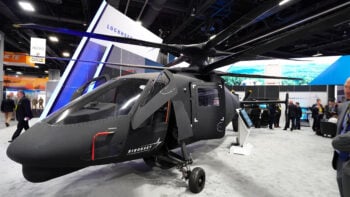
PHILADELPHIA: As the budget outlook for the services seems to get bleaker with each passing day, one Army general says he expects to do pretty well come February.
Maj. Gen Tim Crosby, head of the Army’s program executive office for aviation, said his office’s funding request for the upcoming Fiscal Year 2013 budget should remain pretty much intact once the service unveils its final spending proposal early next year.
Speaking to reporters after today’s event to commemorate the 50th anniversary of the Boeing-built CH-47 Chinook helicopter at the company’s factory here, Crosby said the service’s air portfolio “actually has done pretty well” during the ongoing budget debates inside the Pentagon.
Given the tremendous financial strain the Army and the rest of DoD is under, the two-star general was under no illusions that his office would come out of the budget fray unscathed.
The Army, along with the rest of DoD are
“struggling for dollars” as Capitol Hill and the White House is looking more and more to the Pentagon to pay a part of the national deficit.
To pay that bill, service and DoD budget shops are being forces to “take an appetite suppressant” to balance the books for FY-13 and beyond, Crosby said.
That said, the two-star Army air chief made clear which priorities in the Army air portfolio he could not live without heading into the new fiscal year.
Securing new multiyear deals for the service’s Blackhawks, Chinooks and Apaches, as well as getting the Armed Aerial Scout program finally up and running, headed up Crosby’s to-do list for FY-13 budget plan, or program objective memorandum in Pentagon parlance.
By doing multiyears for those helicopters, Army air officials plan to save between 10 to 15 percent per aircraft, compared to the price the service would have paid by buying each one individually.
But convincing the Army to lock in service dollars for those multiyear buys, especially at a time when spending flexibility is at a premium, will be a tough case to make, Crosby admitted.
“It makes sense, but can we [afford] to do it,” the two-star Army air chief said, adding that multiyears mean the Army will not be able to move those dollars to other, more pressing, service priorities if needed.
While noting the multiyear deals are key to keeping the Army’s air portfolio afloat, in the end Crosby’s office “may have to accept what [the Army] tells me.”
(Full disclosure: Boeing paid for Carlo’s train ride to and from Philadelphia.)
 PHILADELPHIA: As the budget outlook for the services seems to get bleaker with each passing day, one Army general says he expects to do pretty well come February.
PHILADELPHIA: As the budget outlook for the services seems to get bleaker with each passing day, one Army general says he expects to do pretty well come February.

























